How Much Should Extracurriculars Matter?
Students practice their musical instruments outside of school.
June 28, 2022
For the total amount of time and energy students spend on the college application process each year, it would be fair to assume that there is a tried-and-true, agreed-upon formula for creating the best application. Perhaps with a set number of AP classes, a few quality leadership positions, and above a certain score on the ACT or SAT, students could be certain to gain entrance into their college of choice. Unfortunately, high schoolers know all too well that there is no “right” way to get into college, and every school – every individual admissions officer, even – seems to have a different way of handling the process. But what if we lived in a perfect society? How should students be judged? More specifically, what value should extracurricular activities, a supposedly vital part of the application, hold? Members of the Globe staff hold mixed opinions and viewpoints toward this issue, though there are sensible arguments to be made in favor of both sides.
Traditionally, a student’s extracurricular activities are integral to their application but are often valued below more “standard” evaluations of a student’s academic ability, such as grades and test scores. As stated under the admissions section of Yale University’s website, “…academic strength is our first consideration in evaluating any candidate. A large number of Globe staff members find that this makes sense. Colleges are supposed to exist to provide tertiary education to young adults and prepare them for the rest of their lives, particularly in terms of their future professional careers. Therefore, it would be expected that the “top” schools feed into the “top” jobs, and those who go to the “top” schools should be the students who achieve the most academically in high school. Yet, after college makes a point to stress that they consider and value extracurriculars to a high degree as well. This, according to other Globe staff members is also understandable because students are going to be (for the most part) living at their colleges for four years and making them the focal point of their lives, so they should be valued as a whole person. The extracurriculars a student participates in should speak to that person’s unique and individualized interests and give admissions officers a better understanding of who they are really dealing with.
Many Globe staff members argue that extracurriculars show all sides of a student, and give colleges a true idea of the person that is applying to their school. This is generally the explanation colleges themselves give when asked about extracurriculars. Validly so, many members of the Globe staff believe. A few members believe that extracurriculars “make you seem different from any other student.” A relatively uncontested viewpoint among staff members was that pure grades are a much simpler and standardized form of evaluation, and extracurriculars plainly show more about a student. Others have observed that to an elite college, there isn’t much difference between a 97 and a 98. Therefore, extracurricular resumes provide a substantial basis to compare top-achieving students to one another.
Though the importance of extracurriculars is evident, are they as important as grades? According to some Globe staff members, the answer is no. Some hold a number of defenses in favor of lowering the stress on extracurriculars. An opinion held is that “students take advantage of opportunities for the sake of doing them, so colleges are misled”. Since it is clear that colleges do value extracurriculars to some extent, students often end up participating in activities “because of college.” Many staff members agree that Mamaroneck High School is an environment rife with competition to get into the “best” universities. As such, some students fall into the trap of pursuing activities for a resumé, rather than their genuine interests in certain areas.
Issues with extreme emphasis on extracurriculars extend further: some staff members believe that this emphasis exacerbates socioeconomic inequality in the admissions process. These staff members posit that wealthier communities, such as Mamaroneck, provide students with far more options for activities than less affluent communities do. This could unfairly fool admissions officers, as a student from a working-class area will have a less impressive list of activities than a student from an upper-class area purely because of disparate opportunities.
It is clear that there is no heavy consensus within the Globe staff on whether extracurriculars or grades are more important. However, a few potential strategies colleges could use to select students over others were discussed. One such idea is for colleges to base their values around the socioeconomics of a student’s community and therefore the quality and quantity of extracurriculars offered in that place. For wealthier communities, extracurriculars could be weighted higher while in less wealthy communities a greater emphasis could be placed on grades. While this plan of course has its flaws, it could be used as a starting point for some colleges. Regardless, Globe staff members find common ground on the simple notion that both extracurriculars and grades are important and should be valued in nearly all situations.
It is clear that much of the reason why the college application process is so confusing is the difficulty of uniformly and fairly evaluating each student’s high school achievements. Every student comes from a different situation and has their own strengths and weaknesses. Therefore, it is important that colleges continue to evaluate both extracurriculars and grades, choosing how to weigh them on a case-by-case basis. However, no matter what methods colleges use to select students to accept, Globe staff agrees that students in high school should primarily concern themselves with doing their best to get grades and participate in extracurriculars that they are proud of.






